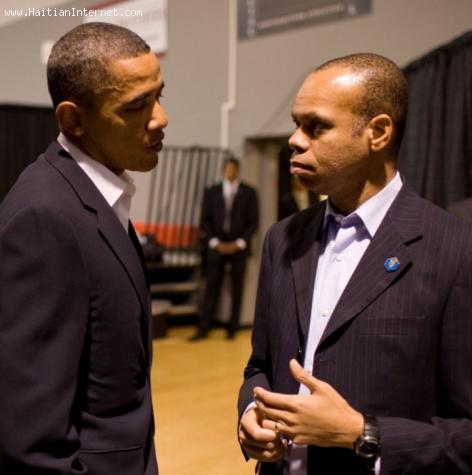Just like Barack Obama is a byproduct of an African man who left his seeds in America, Patrick Gaspard is a byproduct of the Haiti brain drain
The story of Patrick Gaspard, born in Kinshasa, Democratic Republic of Congo, in 1967 to Haitian parents, reflects a pivotal moment in the legacy of Patrice Lumumba's call for diaspora academics to contribute to newly independent African states.
As we delve into Gaspard's narrative, we uncover the interconnected factors that drove Haitians - teachers, professors, engineers, and doctors - to Africa, a phenomenon that inadvertently triggered a significant brain drain in Haiti.
The early 1960s marked a time of seismic change, with African nations gaining independence from colonial powers. Patrice Lumumba's impassioned plea resonated deeply with many in Haiti including Patrick Gaspard's parents.
Gaspard's background exemplifies the hopes and dreams of a generation eager to be part of Africa's transformation.
Born in Kinshasa to Haitian parents who had heeded Lumumba's call, Gaspard grew up with a unique blend of cultural influences.
His story encapsulates the crossroads of identity and opportunity - a tale of being connected to two nations while standing at the forefront of change.
Gaspard's birth in Kinshasa to Haitian parents who responded to Lumumba's plea encapsulates a chapter of intertwined histories, aspirations, and dilemmas.
While his parents journey embody the spirit of unity and collaboration that Lumumba championed, it also symbolizes the brain drain that had a lasting impact on Haiti.
The unintended consequence of Gaspard's parents heeding Lumumba's call was the emergence of a two-fold challenge for Haiti.
On one hand, the nation lost a significant portion of its educated workforce, hampering its capacity to address pressing issues and fueling a cycle of economic stagnation.
On the other hand, the departure of individuals like the Gaspard family meant that Haiti's potential to foster intellectual growth and drive positive change was diminished.
Gaspard's narrative stands as a reminder of the intricate balance between seeking opportunities beyond borders and nurturing the growth and progress of one's homeland.
Related Articles:In the early 1960s, hundreds of Haitian professionals, including teachers, professors, engineers, and doctors, embarked on a journey to Africa. While this migration marked a significant effort to support the growth of African nations, it simultaneously led to a brain drain from Haiti, impacting its development on multiple fronts.
Read more about Barack Obama, Haitians for Barack Obama, Haitian-Americans, Haitian-Americans in Politics, Haitians in the DRC, Patrick Gaspard, Haiti Photo Stories
Hot Haiti Topics
Haiti Photo Stories
New Haiti Topics
Leave a Reply
Name (required) E-mail (required, will not be published)
» »


 Koupye is Good for you : 10 Health Benefits of Koupye, or Pourpiers...
Koupye is Good for you : 10 Health Benefits of Koupye, or Pourpiers...  How many generations to be considered of Haitian descent? How to know if...
How many generations to be considered of Haitian descent? How to know if...  Embracing Identity: Why some Haitian women retain their maiden names and...
Embracing Identity: Why some Haitian women retain their maiden names and...  A tree knocks out light pole during heavy rains in Haiti
A tree knocks out light pole during heavy rains in Haiti  Jovenel Moise will not be able to visit Pont Rouge on October 17th,...
Jovenel Moise will not be able to visit Pont Rouge on October 17th,...  PHOTO: Naomi Osaka holding her trophy after wining the Australian Open
PHOTO: Naomi Osaka holding her trophy after wining the Australian Open  Naomi Osaka during the 2019 Italian Open Third Round Press Conference
Naomi Osaka during the 2019 Italian Open Third Round Press Conference  Billionaire Robert F. Smith
Billionaire Robert F. Smith  The Hispaniolan Solenodon, Called Nen Long in Haitian Creole
The Hispaniolan Solenodon, Called Nen Long in Haitian Creole  PHOTO: Naomi Osaka and Michael B. Jordan
PHOTO: Naomi Osaka and Michael B. Jordan  2018 WTA Finals - Naomi Osaka vs Sloane Stephens
2018 WTA Finals - Naomi Osaka vs Sloane Stephens  PHOTO: Roody Roodboy and his mother
PHOTO: Roody Roodboy and his mother  Naomi Osaka and Coach Sascha Bajin
Naomi Osaka and Coach Sascha Bajin 
 Haiti is gangsterized and the gangsters are not only the thugs...
Haiti is gangsterized and the gangsters are not only the thugs...  An American Priest in Haiti brokers a Peace Pledge between 4...
An American Priest in Haiti brokers a Peace Pledge between 4...  Everyone is talking about a recession these days, how are you...
Everyone is talking about a recession these days, how are you...  Anyone with a gun in Haiti automatically becomes an authority...
Anyone with a gun in Haiti automatically becomes an authority...